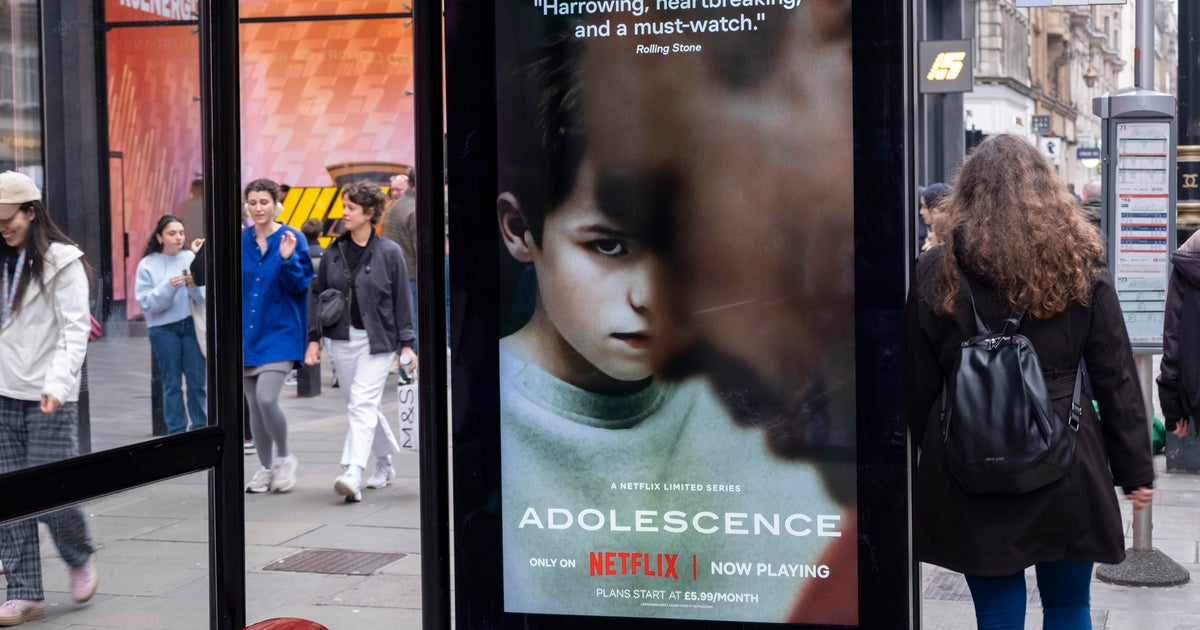London — Netflix’s global hit “Adolescence” has officially become the streaming service’s biggest-ever U.K. drama, amassing over 120 million views and jumping into the Number 3 slot on the list of Netflix’s most popular English-language shows of all time. It has also ranked among the streaming giant’s top-10 shows in the U.S for the past five weeks.
The gritty drama about the risks of pervasive radicalized, violent, misogynistic content online — a world virtually invisible to many older generations — has gripped the British audience and sparked a national conversation that extends from school gates across the country, all the way to the U.K. prime minister’s office in London.
Forcing viewers inside an unbearable reality, the show captures a parent’s worst nightmare. “Adolescence” follows the story of Jamie, a 13 year old boy arrested for a murder that his parents simply cannot believe he is capable of committing. But it quickly becomes clear that he did do it, and his motive shocks and initially perplexes his parents, along with the police, and the show’s massive audience.
It also struck a chord in the corridors of power.
“As a father, watching this show with my teenage son and daughter, I can tell you it hit home hard,” U.K. Prime Minister Keir Starmer told reporters at a roundtable discussion two weeks ago.
“This isn’t a challenge politicians can simply legislate for. Believe me, if I could pull a lever to solve it, I would. Only by listening and learning from the experiences of young people and charities can we tackle the issues this groundbreaking show raises,” he said.
Viewers are given what, for most, was likely a first glimpse into the online world that corrupted Jamie. His victim — a female classmate — had bullied him and called him an “incel” which is short for “involuntary celibate.”
Absorbed in his castigation and left to spend hours scrolling through social media feeds, Jamie comes under the influence of the incel community — men online who spout hatred and encourage violence toward the majority of women, who they say don’t find them appealing.
Those views among Gen Z teenagers are widespread in the U.K. A recent poll by Amnesty International U.K. of Britons between the ages of 16 and 25 found that an overwhelming 73% of Gen Z social media users have witnessed misogynistic content online, with half saying they encounter it on a weekly basis.
Starmer announced that Netflix was making the show free for high schools across the country to stream, in a bid to help students understand, “the impact of misogyny, dangers of online radicalization and the importance of healthy relationships.”
While some fear that risks normalizing the negative behavior, experts in child welfare have told CBS News that shining a spotlight on the issue is long-overdue.
“We have to protect our children by enabling them to be able to look at material if it comes their way and be able to critically assess, ‘Is that something that I should be looking at?'” Susie McDonald, the CEO of the British charity Tender, told CBS News.
Tender has more than two decades of experience working with students to prevent violence and abusive behavior. The group produces guides and resources for schools to support teachers, parents and carers to navigate conversations around the topics explored in the Netflix hit.
In early April, Tender put on a workshop at a West London school to help children between the ages of 9 and 11 learn to navigate difficult subjects and recognize controlling behavior through games and drama. The workshop involved children defining phrases such as “gaslighting,” and waving physical red flags to identify problematic language when they heard it in acted-out conversations.
“Through scripts and through different games and exercises, they’re rehearsing for the relationships that start as friendships,” McDonald said. “As they get older… as relationships perhaps become more intimate or romantic, they can apply everything that they’ve learned about what they want from friendships into those romantic relationships.”
McDonald cautioned against putting too much focus on the susceptibility of boys and young men, at the risk of diminishing attention put on the wider issue of violence against women, but said she thinks boys in particular do need to be protected at a young age.
“What we can’t do is blame boys,” she said. “But we have to change our narrative. We have to pay attention to boys and we have to protect boys from becoming perpetrators.”
“For forever, we’ve been looking at how we protect and prevent girls from becoming victims,” she told CBS News. “But if we’re going to achieve that, we have to work with boys in a really supportive way, to say, ‘You can be part of preventing violence against women and girls.”




